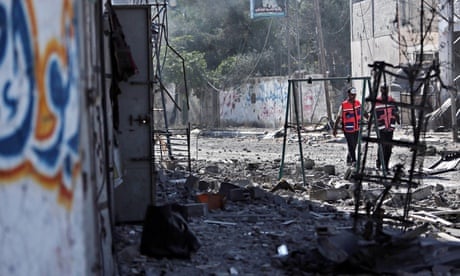The UN has said that Israel may have committed war crimes in its offensive against Hamas in Gaza, in which hundreds of Palestinian civilians have been killed in two weeks, and voted to launch an international inquiry. The US opposed the move, and 17 countries abstained.
"There seems to be a strong possibility that international law has been violated, in a manner that could amount to war crimes," Navi Pillay, the UN high commissioner for human rights, said in the debate in Geneva.
Later, Hamas's leader-in-exile, Khaled Mishal, said the organisation would consider a humanitarian truce in the 16-day conflict in Gaza if Israel agreed to lift its blockade.
In comments that appeared to restate the Hamas position set out more than a week ago, Mishal told a news conference in Doha that he would not agree to a full ceasefire until terms had been negotiated.
The Egyptian government has proposed both sides halt fighting first, and negotiate soon after. "Everyone wanted us to accept a ceasefire and then negotiate for our rights, we reject this and we reject it again today," Mishal said. But, he added, Hamas "will not close the door" to a humanitarian truce if Israel ended its siege of Gaza.
Mishal's statement came after the US secretary of state, John Kerry, shuttled between Jerusalem and Ramallah for talks with Israeli, Palestinian and UN leaders in an urgent quest for a deal to end the fighting. "We have certainly made small steps forward," he said between meetings, but added: "There is still work to be done."
Israel continued to pound the Gaza Strip on Wednesday, with hundreds of people trapped in the village of Khuzaar, near Khan Younis, unable to escape the bombardment. The International Committee of the Red Cross (ICRC) negotiated a brief pause to allow a convoy of ambulances to evacuate the wounded. Similar lightning evacuations were undertaken in Shujai'iya, scene of a bloody battle on Sunday, and Beit Hanoun in northern Gaza.
Aid agencies said a child had been killed every hour on average in the past two days, and there had been a sharp spike in premature births. Gaza officials said more than 3,000 homes had been destroyed or damaged, and 46 schools, 56 mosques, and seven hospitals had been hit. Israel claims that militants fire rockets from and store weapons in civilian buildings.
Some airlines that suspended flights in and out of Tel Aviv's Ben Gurion airport on Tuesday over security concerns extended the measure for a further 24 hours as rocket fire from Gaza continued throughout the day. The US Federal Aviation Authority imposed a flight ban on all US carriers, with other airlines following suit, causing disruption to tourists and business. British Airways and the Israeli national carrier El Al continued to fly to and from Israel.
As the death toll on the 16th day of conflict topped 700 – more than 690 Palestinians and 35 Israelis including three civilians – Pillay told an emergency debate at the UN human rights council (UNHRC) in Geneva that Israel had not done enough to protect civilians, citing air strikes and the shelling of homes and hospitals.
She also condemned Hamas and other militant groups for "indiscriminate attacks" on Israel.
Her comments were seen as a warning to remind Israel of its obligations under international law. She also called for an end to the blockade of Gaza, the underlying reason for the conflict and an issue that would have to be tackled if any ceasefire were to endure.
The UNHRC backed a resolution calling for the urgent dispatch of "an independent, international commission of inquiry" to investigate violations of international human rights and humanitarian law.
Israel would be highly unlikely to cooperate with any such inquiry. Its envoy to the council, Eviatar Manor, accused Hamas of committing war crimes and said Israel was acting as any other state would in seeking to defending its citizens. "There can be no moral symmetry between a terrorist aggressor and a democracy defending itself," he said. Hamas was a terrorist organisation, not the Salvation Army, he said, adding that it was responsible for civilian casualties because it was using people as human shields.
Riad Malki, the Palestinian foreign minister, appealed to the international community to hold Israel accountable for its actions in Gaza. "How many martyrs must die before Israel puts an end to its aggression?" he asked.
In Washington, a state department official said Kerry was expected to remain in the Middle East for the next few days", possibly moving around the region. Kerry has indicated privately that he does not want to return to the US without securing a ceasefire.
US officials rejected the suggestion that his high-profile failure to hold together peace negotiations have reduced his leverage in the region, or led to a diplomatic vacuum which allowed the current conflict to escalate.
They pointed out that the current conflict has also escalated beyond hostilities in 2012, when Israel stopped short of launching a ground invasion. While Kerry believes Egypt, which controls border crossings into Gaza, will be central to any negotiated ceasefire, he has acknowledged that the country's president, Abdel-Fatah al-Sisi, has nowhere near the leverage with Hamas that helped his predecessor, Mohamed Morsi, convince the Palestinian side to pause the conflict.
